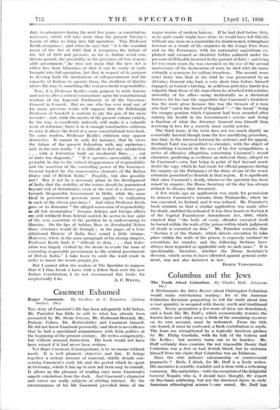Casement Exhumed
THE story of Casement's life has been adequately told before. Mr. Parmiter has little to add to what has already been recounted by Mr. Denis Gwynn, Mr. Redmond-Howard, Mr. Padraic Colum, Dr. Rothenfelder and Casement himself. He did not know Casement personally, and there is no evidence that he had a specialised acquaintance with Irish politics at the beginning of the present century. He writes competently, but without unusual distinction. His book would not have been missed if it had never been written.
Yet Roger Casement, if unimportant, is by no means without merit. It is well planned, objective and fair. It brings together a certain amount of material, chiefly details con- cerning Casement's early life and the period which he spent in Germany, which it has up to now not been easy to consult.. It allows us the pleasure of reading once more Casements superb valediction from the dock. And Casement's character and career are really subjects of:. abiding interest. By the circumstances of his life Casement provided - three of the major ironies of modern history. It he had died before 1914, as he quite easily might have done, he would have left this life without any stain on a reputation for disintere4ed, triumphant heroism as-a result of his enquiries in the Collor Free State and on the Putumayo, with his nationalist aspirations ex- plained and excused as idealistic 'foibles asanned under the
• pressure of ill health incurred-in the pursuit of duty ; surviving • for two more years (he was executed on the eve of the second ! anniversary of the declaration of war), he died with his name virtually a synonym for callous treachery. The second, more cruel irony was that at his trial he was prosecuted by an Attorney General who had, a very short time before, himself engaged, as Carson's hireling, in seditious activities barely less culpable than those of the man whom he attacked with a malice unworthy of his office—using incidentally as a rhetorical buttress for his case the suggestion that Casement's treachery
was the more gross because this was the treason of a man who had " eaten the bread of England "—" the bread " being the meagre pension which Casement had been awarded after ruining his health in the Govermnent's service and being a fraction of what the Attorney General was himself then receiving in fees for a scarcely more useful service.
The third irony, if the term does not too much dignify an essentially farcical though none the less unedifying procedure, was that, in the interval between his sentence and his appeal, Scotland Yard was permitted to circulate, with the object of discrediting Casement in the eyes of his few" sympathisers, a series of offensive allegations concerning Casement's moral character, proffering as evidence an indecent diary, alleged to be Casement's own, but being in point of fact beyond much doubt the copy which he had made for official purposes during his enquiry on the Putumayo of the diary of one of the worst criminals permitted to flourish in that region. It is significant that since Casement's .death, whenever the question has been raised by enquiry, the Home Secretary of the day has always refused to discuss that document.
A few weeks ago an application was made for permission to remove Casement's remains from Pentonville, where he was executed, to Ireland, and it was refused. Mr. Parmiter's book reminds us that a similar application was made after his death, andthat the refusal of it was then based on Section,6 of the Capital Punishment Amendment Act, 1868, which enacted that " the -body of every offender executed shall be buried within the walls of the prison within which judgment of death is executed on him." Mr. Parmiter remarks that
Section 2 of the Statute, which directs execution to -take-
place within the walls of the prison, is expressly confined to ' executions for murder, and the following Sections have always been regarded as applicable only to such cases." It is. questionable, therefore, whether the Home Secretatyts decision, which seems to have offended against general senti-: anent, was not also incorrect in law.
DEREK VERSCIWYLE.












































 Previous page
Previous page